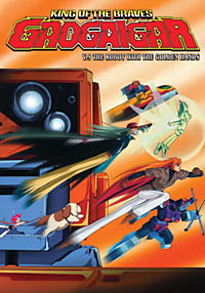Review
by Carl Kimlinger,GaoGaiGar: King of Braves
DVD 5 - Robot with the Golden Hand
| Synopsis: |  |
||
The destructive power of the Goldion Hammer is such that a new robot is made exclusively to handle it; Goldymarg is big, brash and very, very powerful. He soon proves his worth, and is quickly incorporated into GGG's robotic hero corps. In America, Dr. Shishioh's elder brother Liger hasn't been sitting on his laurels since the invention of the Dimensional Pliers. In an exchange of ideas and technologies, NASA sends him to GGG with their latest robot, Mic Saunders the 13th, a suspiciously useless robot of unknown purpose. The Zonderians aren't sitting on their rears either. They send several Zonders after GGG, and Pizza takes personal action against Mamoru. However, he's beginning to remember his past, and Kaidou, Mamoru's mysterious purple-haired classmate, may prove to be an unexpected impediment. |
|||
| Review: | |||
In a show whose appeal lies in the fun factor, how does one keep the crucial mix of silliness and robo-bashin' fresh and fun? By introducing even more robots, of course! Meet Goldymarg, a giant robot made with the specific purpose of enabling Gaogaigar to use the Goldion Hammer. His AI was based on Major Hyuuga's personality, so he's hot-headed, arrogant, and prone to acts of excessive recklessness. Being similar, Hyuuga and Goldymarg naturally get along like cats and dogs. And then there's Mic Saunders the 13th, an American robot that resembles a cheap remote-controlled toy blown up to three or four stories in height. Mic proves to be rather hilariously inept, but is joined later by mysterious guitar-playing rock star robot. That's right, a robot rock star. Adding more straight-faced weirdness to the mix, the Goldion Hammer takes the "tool" theme of Gaogaigar's weapons (driver/pliers/hammer) to new heights with "Hammer Hell and Heaven," a move that extracts Zonder Cores by driving energy nails into a Zonder and pulling them out with a nail claw. Amusing the series' excesses may be, and finding connections between it and director Yoshitomo Yonetani's later Brigadoon (the seiyuu for Mic plays a similar character of the same name in both shows) may be diverting, but perhaps the series' greatest achievement is to make working for GGG seem such blasted fun. Watching Shishioh play with his massage chair (it actually has hands) or Entohji asleep on the job, one can't help thinking what a great workplace it must be. Where else can someone (Mikoto) get paid for smashing a button through its protective glass? And then there's Chief Taiga, whose job is to shout, pose, point dramatically, and occasionally slam a key home and turn it with unnecessary force. I want that job, killer robots be damned. It's not all fun and games, which is both good and bad. Good in that Pizza and reticent purple-headed classmate Kaidou seem poised to complicate things in the near future, and bad in that when the fun and games stop, things get boring. As of yet, drama isn't Gaogaigar's strong suit, though luckily it's still fairly rare that the series tries it with any sincerity. There's also a partial recap episode, disguised as the various robots bragging about their special abilities, which is an utter waste of time. If you've been watching the series up to this point, you know what you're getting visually. Massive giant robot action with enough repeated animation to draw revealing comparisons with magical girl shows, dated computer effects, and incidental animation that is rife with simplified art and shortcuts. There's a little more fan service (Miss Swan runs around most of the time in Daisy Dukes), and Mic Saunders is the first robot to more closely resemble the rather silly character designs than the carefully produced backgrounds and buildings. That aside, this isn't the kind of show to change its production part way through or to experiment, so more of the same is exactly what it offers. This goes for the soundtrack as well, with its only noteworthy variation being the diegetic use of the opening theme in episode 25. The dub is the same overplayed, compulsively faithful beast it has been as of late. It captures much of the charm of the original, even if it isn't exactly perfect (the digital effects used for robot voices are cheesy, background dialogue is too sparse). It does benefit greatly from the fact that the NASA engineers lose their heavily accented English, and the over-enthusiastic Mic is perfect. The now-standard collection of mecha production art is the only extra included with these five episodes. It can't be said enough; Gaogaigar isn't a show with universal appeal. This is a loving giant robot pastiche/light parody targeting those whose ears perk at the mere sound of those words. And with each passing volume it becomes less and less likely that it will ever become anything more. Of course, with the series currently on hiatus, it might take some time to find out for sure. |
| Grade: | |||
|
Overall (dub) : B-
Overall (sub) : B-
Story : C+
Animation : C+
Art : B
Music : B
+ Never strays far from what has made it such retro fun. |
|||
| discuss this in the forum (13 posts) | | |||
| Production Info: | ||
|
Full encyclopedia details about Release information about |
||